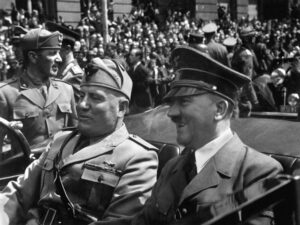The so-called phony war ended in May 1940 when the Battle of France began. It would end in disastrous defeat for the Allies. In phase one of the battle, Fall Gelb (Operation Yellow), the Wehrmacht’s rapid advance outwitted Allied Forces defending Belgium in anticipation of Germany repeating its World War I attack plan. This time Germans poured through the Ardennes Forest (a feat thought impossible by Allied strategists) and outflanked the defenses.
After fierce fighting, the British Expeditionary Force (BEF) – along with many French soldiers – was driven back to the sea and mounted a defiant last stand. This – and Hitler’s decision to hold back his generals for three days and leave the task of preventing the BEF’s escape to the Luftwaffe – allowed Britain to organize Operation Dynamo. The dramatic evacuation of 338,000 mainly British troops from the beaches of Dunkirk by the Royal Navy and the famously gallant flotilla of small boats took place between May 27 and June 4.
Having mopped up resistance in the northwest, the Germans began phase two of the battle on June 5. Fall Rot (Operation Red) involved outflanking France’s vaunted (but ultimately useless) defensive Maginot Line, smashing through demoralized defenders and heading through the French heartland towards Paris. The government fled to Bordeaux and Paris fell on June 14. Newly elected French leader Marshal Petain sued for peace and an armistice was signed on June 25. The Battle of France was over, barely six weeks after it began.
If there was a glint of silver in the Allies’ dark cloud, it was Dunkirk, where the soundly trounced BEF turned the tables by slipping away before the Wehrmacht’s steel jaws snapped shut, living to fight another day… a great escape that probably prevented Germany from winning World War II in 1940.
When: May 10 to June 25 1940
Where: Northern France
Death toll: Approximate casualty figures in the Battle of France were 170,000 Allied and 49,000 German dead.
You should know: Hitler later suggested that he allowed the BEF to escape from Dunkirk as a gesture of goodwill, in the hope that Britain would appreciate his merciful gesture and be encouraged to enter into a negotiated peace settlement. But the facts don’t support this claim – the German army’s Directive 13 issued on May 24 called for the total annihilation of all forces within the Dunkirk pocket.






















